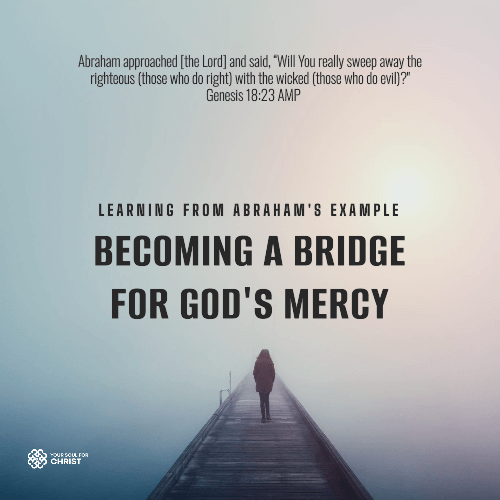Abraham approached [the Lord] and said, “Will You really sweep away the righteous (those who do right) with the wicked (those who do evil)?”
Genesis 18:23 AMP
Previously, we discussed a significant lesson from Ezekiel 22. We explored the Lord’s search for an individual who could bridge the gap, a restorer, an intercessor, but found none. Meanwhile, we emphasized that this search is not confined to the past. God continues to seek men and women in our world today. Let’s now consider Abraham, a man God found before He brought judgment upon Sodom and Gomorrah.
Genesis 18:17 reveals God’s reflection on His plan, which He shared with Abraham. This underscores that to stand in the gap for others, one must be in close communion with God. You must be a person to whom God can reveal His plans. Without insight into God’s plans, one might not fully understand the gaps they are meant to bridge or intercede effectively for the expected restoration. Communion with God forms the foundation for becoming a gap-filler and fulfilling God’s purpose.
Upon hearing God’s judgment concerning Sodom and Gomorrah, Abraham approached the Lord. He pleaded for mercy over the land and its inhabitants. God expects this attitude from anyone who will fill the gap and plead for mercy, preventing His judgment from befalling the people. Such individuals must be able to approach God, not to lament, but to plead for His mercy and intercede for the people.
Genesis 18:24-33 provides insight into the conversation between God and Abraham. Abraham pleaded that God would spare the city for the sake of 50 righteous people, and God agreed. The absence of 50 righteous individuals among the multitudes living in the land did not deter Abraham from his intercession. Instead, he continued to negotiate, lowering the number to 45, then 30, then 20, and finally 10.
It’s important to note that God did not become angry at Abraham’s persistent pleas. God is interested in individuals who will engage Him. He is ready to be merciful as long as there is someone requesting His mercy. This illustrates how God expects us to be persistent in prayer and intercession. Our persistent prayers do not anger God. Instead, He is willing to listen to them.
In the end, the judgment on Sodom and Gomorrah didn’t affect Lot and his family because they escaped. If there had been ten righteous people in the land, as Abraham requested, they could have saved the entire land. This was possible because one man, who was in right standing with God, took on the responsibility and interceded for the people.
We can learn from Abraham’s example: his right standing with God, his manner of approach, and his persistence in prayer. If we are also willing to engage God, He is ready to hear our requests.
In conclusion, the story of Abraham’s intercession for Sodom and Gomorrah serves as a powerful reminder of the impact one person can have when they stand in the gap for others. It underscores the importance of maintaining a close relationship with God, understanding His plans, and persistently praying for His mercy. As we strive to follow Abraham’s example, we, too, can become effective intercessors, bridging the gap between God’s judgment and His mercy for the people around us.
